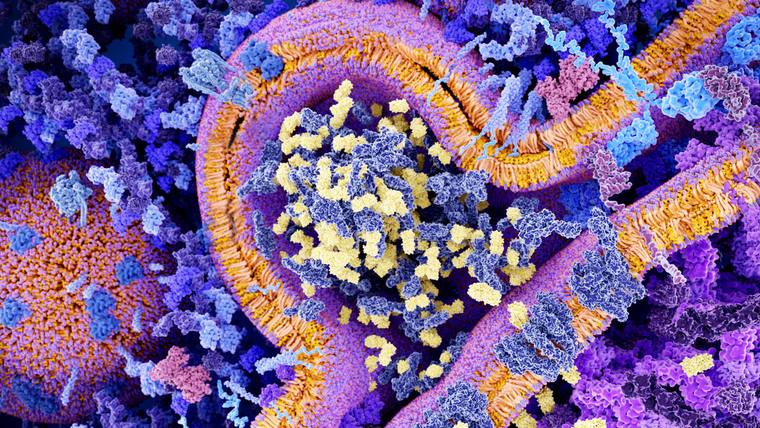-
Unleashing CAR-T cell therapy to destroy solid tumors in thyroid cancer

Mayo Clinic researchers will jump four hurdles to apply chimeric antigen receptor-T cell therapy (CAR-T cell therapy) to solid tumors in thyroid cancer. This regenerative immunotherapy has shown promising results in blood cancers, and new research is focused on using this treatment on more types of malignancies.
"CAR-T cell therapy is unlike other therapeutics," says Saad Kenderian, M.B., Ch.B., a hematologist and cancer researcher. "Other therapies may slow down cancer. CAR-T cell therapy has shown great promise in stopping B-cell lymphomas and leukemias. Some of my patients have gone into complete remission that has lasted for years after just one treatment."
CAR-T cell therapy harnesses the power of the body's immune system to kill tumors. T cells are taken from a patient, then genetically modified and returned to the body to act as guardians against cancer.
In a team science approach, Dr. Kenderian and John Copland III, Ph.D., are collaborating as principal investigators on research to develop CAR-T technology for solid tumors in thyroid cancer. However, to do so they must address four challenges.
1. There are no clear targets in solid tumors
CAR-T cells are engineered to target specific proteins and antigens that are on the surface of cancer cells. Antigens are substances that activate the body's immune system. CARs are genetically programmed to trigger an immune response and destroy cancer cells.
"However, there are few clear targets on solid tumors like we have in liquid tumors," says Dr. Kenderian. "For CAR-T cell therapy to be successful, the first thing that we need to do is identify a protein to target that is unique to cancer cells that is not also expressed on normal tissue."
The teams of Dr. Kenderian and Dr. Copland believe they have identified such a target in the thyroid stimulating hormone receptor (TSHR) which is uniquely found on thyroid cancer cells in the thyroid gland. They are engineering THSR targeting into CAR-T cell therapy for thyroid cancer. This is known as TSHR CAR-T.
2. One treatment type doesn't fit all solid tumors
Solid cancers are comprised of many cell subsets. As a result, a tumor may have genetic mutations in some cells that aren't present in others. This is known as tumor heterogeneity, and it makes it difficult to treat these cancers with a single therapy.
"To overcome the tumor heterogeneity, we are using a strategy to combine TSHR CAR-T cell therapy with small molecules to block cancer cells from growing and metastasizing," says Dr. Copland. "We are studying whether loading CAR-T cells with this synthetic receptor in combination will trigger a cancer fighting response."
3. Solid tumors may be resistant to CAR-T cell therapy
Unlike blood cancers, solid tumors exist in a microenvironment that suppresses the immune system. In addition, dense clusters of malignant cells may create a barrier that blocks the CARs from bringing their cancer fighting mechanisms into cells.
"One strategy for overcoming this challenge is to target cells that are contributing to tumor aggressiveness," says Dr. Copland. "Another is to develop technology known as dual CARs that recognize two different targets. We are studying whether that will overcome tumor resistance."
4. Treating solid tumors may cause side effects
CAR-T cell therapy could mistakenly attack nearby healthy tissue, triggering what's known as "off-target effects." The result might be adverse side effects that are hard for the patient to tolerate. TSHR is a unique target that is expressed only on thyroid cancer cells and not on normal tissues, which minimizes the risk.
On-site biomanufacturing is a bridge to clinical trials
Dr. Kenderian and Dr. Copland are refining the TSHR CAR-T cell technology in the lab and in preclinical models. Biomanufacturing at Mayo Clinic will provide a bridge to accelerate this technology from the lab to early-stage clinical trials.
The process development team within Mayo Clinic's Center for Regenerative Biotherapeutics now is conducting test runs and establishing standard operating procedures in preparation for biomanufacturing this technology at Mayo Clinic.
"On-site biomanufacturing is critical to preserving the integrity of the cells during manufacturing," says Dr. Kenderian. "This is a very complex technology with many components that would make it difficult, if not impossible, to ship to an outside manufacturer."
Dr. Kenderian and Dr. Copland are driven by a passion to provide new therapies for patients who have few or no therapeutic options. Their goal is to advance CAR-T cell therapy for thyroid cancer to a first-in-human clinical trial by early 2026.
###
Related stories:
CAR-T cell therapy restores hope for leukemia patient
CAR-T cell researchers at Mayo Clinic optimistic about future of treating blood cancers







